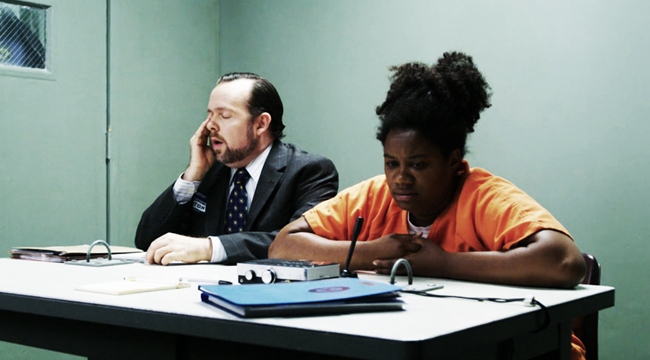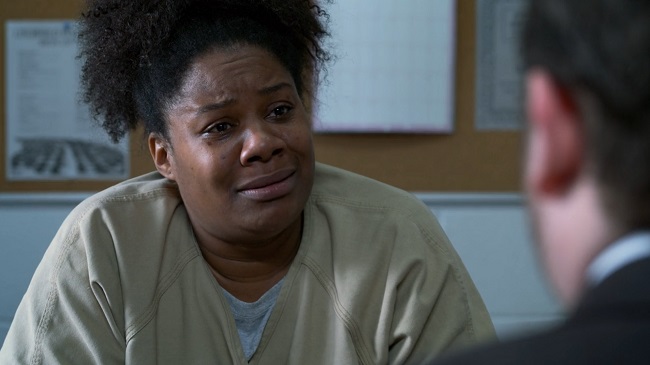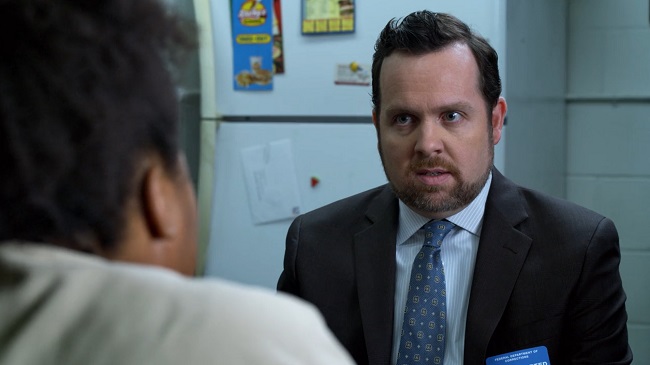
Warning: This article contains Orange Is the New Black season six spoilers.
Judging by the critical response so far, Orange Is the New Black season six is a vast improvement upon season five’s mishandled prison riot storyline. It is by no means the best season of the popular Netflix series, which follows the lives of inmates at an all-female correctional facility, but it doesn’t have to be considering what came before. Even with the purposeful loss of a nearly a dozen other characters — resulting in a slightly leaner, though nonetheless chock-full of too much story, a stretch of 13 episodes — season six does pretty well, and it has one of creator Jenji Kohan’s latest new pairings to thank for that.
I’m not talking about the warring cell block gang leaders and sisters Barb (Mackenzie Phillips) and Carol (Henny Russel), whose violent though humorous rivalry is one of the season’s best additions. Nor am I talking about Flaca (Jackie Cruz) and Black Cindy’s (Adrienne C. Moore) new prison radio show “Flava,” named by combining Flaca’s name with Cindy’s Hebrew name, Tova. No, the best new duo season six gifts to viewers is actually one of its shortest, but most poignant, pairings: Black Cindy and Reuben Siegel (Connor Ratliff), the lawyer her Rabbi sends to defend her in the riot investigation and trial.
As the premiere episode, “Who Knows Better Than I,” reveals, investigators and pro-police groups are out for blood following the Litchfield riot. They are especially angry over the apparent murder of Officer Piscatella by the inmates, though the sadistic prison guard was actually killed by a fellow officer’s stray bullet. Cindy and Suzanne (Uzo Aduba) witness the riot police re-staging Piscatella’s death to frame the inmates but decide to keep quiet in order to save themselves. So when Siegel arrives, aside from helping Cindy avoid any riot-related punishments, his main job is to make sure she isn’t blamed for what she didn’t do.
Siegel’s ability here seems lackluster at best, especially when he first meets Cindy. Upon entering the prison meeting room, he exclaims, “Sorry, I know I’m late but I have a good reason. I won a trial!” On paper, the first line of dialogue for Siegel can go either way, and thanks to Ratliff’s performance and Moore’s bemused reaction, both possibilities are on full display. Siegel is excited, but Cindy is not. “Congratulations?” she asks, prompting his unintentionally hilarious response. “I know I shouldn’t brag, but I’m just so shocked. I thought for sure this guy was going down.”
Throughout Siegel’s explanation, Cindy exudes a range of emotions that include everything from disinterestedness to surprise, an array that would otherwise prove disastrous for any new pairing in Orange‘s world. This first meeting is far too early to determine whether the young attorney will be able to help Cindy out. Yet the professional relationship between them that flourishes throughout the rest of “Sh*tstorm Coming,” and later in “Well This Took a Dark Turn,” indicates that Siegel’s arrival isn’t a fleeting moment in an otherwise packed season. What’s more, Moore and Ratliff’s work together excels.

Ratliff, an Upright Citizens Brigade alum, is best known for his work on truTV’s improv-heavy comedy The Chris Gethard Show. Even so, he came to Orange with a mix of the two very different world’s distinct skill sets, thanks to some time spent in London and a growing list of credits that includes TBS’ Search Party and Mike Birbiglia’s dramedy Don’t Think Twice. As a result, he boasts a genuine ability to balance the script’s written words with a sense of light improv and playfulness that Moore, a theater veteran, appreciates.
“While we were waiting for camera set up, and other things like that, we would just talk and get to know each other,” Moore told Uproxx. “Every once in a while, I’d ask him if he wanted to run through the lines real quick and he’d be all for it. So we would read them once or twice, then we’d get back into our conversation. We never planned anything. We just wanted to make sure that we knew our lines, and he was very open. He was a very good actor to bounce and play off of.”
Ratliff, in turn, lauds Moore for her professionalism during and between takes, and her willingness to be just as playful.
“It felt like she was reacting to things that I was doing and I was reacting to things that she was doing,” he recalls. “We were both volleying things back and forth at, and being surprised by, each other. In a way, it distracts you from any tendency you might have to plan something too tightly. You can get caught up in little mannerisms that way, but with Adrienne, that never happened to us.”
This all may sound like two actors delivering compliments to each other, which it is, but it also serves as context for what the duo manages to accomplish on screen in their two episodes together. Tierce, who’s credited as the Orange staff writer for both entries, and Kohan deserve all the credit for the written work that informs Moore and Ratliff’s performances, of course, but the manner in which they bring their characters’ interactions to life stands apart. They do it so wonderfully and succinctly that viewers may believe Cindy is truly as screwed as she thinks she is after Siegel boasts about his recent trial win.
“I’m coming off a hefty slump,” he exclaims, though it’s the phrase “hefty slump,” and not the victory itself, that catches Cindy’s attention. “Hold up. A ‘hefty slump’? Man, [Rabbi] Tatelbaum told me he was sending in a big gun. Are you even Jewish? You lookin’ mighty shegetz to me right now.” When Siegel tries to “assure” Cindy that he is, in fact, Jewish, the inmate gives him yet another one of her more GIF-able reactions before sarcastically asking, “On your mama’s side?”

“With the gravitas of the moment, I think he was brilliant in even trying to find comedy in this situation of his being a lawyer who has never really gotten anybody off,” Moore laughs. “I mean, there are cases that he’s won, but he won them by default, so I’m like, ‘Wait a minute. I need somebody who’s going to get me off.’ Hence the strategy our characters eventually employ to try and win, even with a lawyer that Cindy’s not too sure about.”
The strategy, which many of the other Litchfield riot instigators adopt independently or in congress with others, involves blaming Taystee (Danielle Brooks) for Piscatella’s death. Siegel never realizes this is happening, obviously, as the inmates are acting out of fear, primarily a fear of the vengeful guards and investigators. It’s not until Cindy breaks down mere hours before her courtroom testimony — when Siegel is trying to provide her with some last-minute coaching — that the truth comes out. And the scene that results between the two is one of the season’s most moving, and most heart-breaking, moments.
“Remember, the truth is on your side,” Siegel tells an increasingly distraught Cindy. “All you have to do is tell your story to the court the way you told me.” When she finally breaks, admits all of her planned testimony and previous statement is “bullshit,” and tells him what really happened, he has no idea what to do. Siegel, wide-eyed and as uncertain as he on the heels of his surprise legal victory when they first met, tries to calm his client down, but ultimately reinforces the very system she fears.
“Listen to me,” he says. “You won’t help her, but you will end up hurting yourself.” In a final effort to plead with him, Cindy exclaims that Taystee “didn’t do it,” but to no avail. “Then let’s hope the jury determines that,” Siegel responds, “but as far as you helping her, it’s too late.”
“Ultimately, as an audience member, the thing that I respond to is the look in someone’s eyes,” says Ratliff. “That’s just a wild card factor, the gleam in an actor’s eyes, and it’s a hard thing to quantify. When you’re getting to that point while filming a scene, sometimes the main factor involved in determining whether you get it right away, or if it requires a lot of takes, stems from the idea behind a director’s knowing it when they see it. For all this preparation, sometimes you just don’t get it immediately, unless everyone in the scene nails everything down, including their eyes.”
Sure enough, playful banter notwithstanding, one of the many things that stands out about Moore and Siegel’s work together as Cindy and Siegel are their eyes, and nowhere is this more present than during this final scene. All of the inmate’s prior concerns about her Rabbi-appointed lawyer are gone, and all that’s left is her desperation. Cindy finally makes prolonged eye contact with him, tears running down her face as she pleads for his help. Siegel, meanwhile, is so taken aback that all he can do is stare back with shocked naivety. It’s one of their most emotional and gripping moments together, and it’s also why they’re one of Orange season six’s best new duos.
‘Orange Is the New Black’ season six is now available to stream on Netflix.






